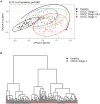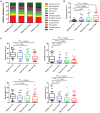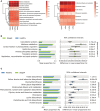Oral Microbiota Community Dynamics Associated With Oral Squamous Cell Carcinoma Staging
- PMID: 29774014
- PMCID: PMC5943489
- DOI: 10.3389/fmicb.2018.00862
Oral Microbiota Community Dynamics Associated With Oral Squamous Cell Carcinoma Staging
Abstract
Oral squamous cell carcinoma (OSCC) is a highly aggressive cancer and the fourth leading malignancy among males in Taiwan. Some pathogenic bacteria are associated with periodontitis and oral cancer. However, the comprehensive profile of the oral microbiome during the cancer's progression from the early stage to the late stage is still unclear. We profiled the oral microbiota and identified bacteria biomarkers associated with OSCC. The microbiota of an oral rinse from 51 healthy individuals and 197 OSCC patients at different stages were investigated using 16S rRNA V3V4 amplicon sequencing, followed by bioinformatics and statistical analyses. The oral microbiota communities from stage 4 patients showed significantly higher complexity than those from healthy controls. The populations also dynamically changed with the cancer's progression from stage 1 to stage 4. The predominant phyla in the oral samples showed variation in the relative abundance of Fusobacteria, Bacteroidetes, and Actinobacteria. The abundance of Fusobacteria increased significantly with the progression of oral cancer from the healthy controls (2.98%) to OSCC stage 1 (4.35%) through stage 4 (7.92%). At the genus level, the abundance of Fusobacterium increased, while the number of Streptococcus, Haemophilus, Porphyromonas, and Actinomyces decreased with cancer progression. Fusobacterium periodonticum, Parvimonas micra, Streptococcus constellatus, Haemophilus influenza, and Filifactor alocis were associated with OSCC, and they progressively increased in abundance from stage 1 to stage 4. The abundances of Streptococcus mitis, Haemophilus parainfluenzae, and Porphyromonas pasteri were inversely associated with OSCC progression. We selected a bacterial marker panel of three bacteria (upregulated F. periodonticum, down-regulated S. mitis, and P. pasteri), which had an AUC of 0.956 (95% CI = 0.925-0.986) in discriminating OSCC stage 4 from the healthy controls. Furthermore, the functional prediction of oral bacterial communities showed that genes involved in carbohydrate-related metabolism, such as methane metabolism, and energy-metabolism-related parameters, such as oxidative phosphorylation and carbon fixation in photosynthetic organisms, were enriched in late-stage OSCC, while those responsible for amino acid metabolism, such as folate biosynthesis and valine, leucine, and isoleucine biosynthesis, were significantly associated with the healthy controls. In conclusion, our results provided evidence of oral bacteria community changes during oral cancer progression and suggested the possibility of using bacteria as OSCC diagnostic markers.
Keywords: 16S rRNA sequencing; cancer progression; community dysbiosis; complexity; oral microbiome.
Figures






References
-
- Al-Hebshi N. N., Nasher A. T., Maryoud M. Y., Homeida H. E., Chen T., Idris A. M., et al. (2017b). Inflammatory bacteriome featuring Fusobacterium nucleatum and Pseudomonas aeruginosa identified in association with oral squamous cell carcinoma. Sci. Rep. 7:1834. 10.1038/s41598-017-02079-3 - DOI - PMC - PubMed
LinkOut - more resources
Full Text Sources
Other Literature Sources

